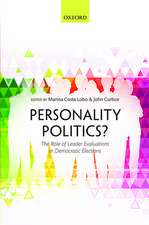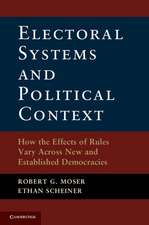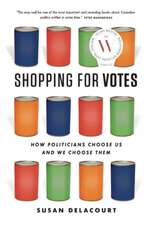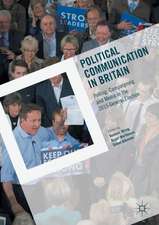Electoral Engineering: Voting Rules and Political Behavior
Autor Pippa Norrisen Limba Engleză Paperback – 8 feb 2004
| Toate formatele și edițiile | Preț | Express |
|---|---|---|
| Paperback (1) | 284.11 lei 6-8 săpt. | |
| Cambridge University Press – 8 feb 2004 | 284.11 lei 6-8 săpt. | |
| Hardback (1) | 579.80 lei 6-8 săpt. | |
| Cambridge University Press – 8 feb 2004 | 579.80 lei 6-8 săpt. |
Preț: 284.11 lei
Nou
Puncte Express: 426
Preț estimativ în valută:
54.38€ • 59.09$ • 45.71£
54.38€ • 59.09$ • 45.71£
Carte tipărită la comandă
Livrare economică 21 aprilie-05 mai
Preluare comenzi: 021 569.72.76
Specificații
ISBN-13: 9780521536714
ISBN-10: 0521536715
Pagini: 390
Ilustrații: 24 b/w illus. 24 tables
Dimensiuni: 152 x 229 x 22 mm
Greutate: 0.51 kg
Editura: Cambridge University Press
Colecția Cambridge University Press
Locul publicării:New York, United States
ISBN-10: 0521536715
Pagini: 390
Ilustrații: 24 b/w illus. 24 tables
Dimensiuni: 152 x 229 x 22 mm
Greutate: 0.51 kg
Editura: Cambridge University Press
Colecția Cambridge University Press
Locul publicării:New York, United States
Cuprins
Part I. Introduction: 1. Do rules matter?; 2. Classifying electoral systems; 3. Evaluating electoral systems; Part II. The Consequences for Voting Behavior: 4. Party systems; 5. Social cleavages; 6. Party loyalties; 7. Turnout; Part III. The Consequences for Political Representation: 8. Women; 9. Ethnic minorities; 10. Constituency service; Part IV. Conclusions: 11. The impact of electoral engineering.
Recenzii
'This is a welcome contribution to the debate on how electoral systems shape political strategies. It should be read by all students of electoral systems, not only because it is well researched and well written, but also because it brings attention to the lesser known systems of preferential voting…'. Journal of Commonwealth and Comparative Politics
'… this is a book rich in its insights and detailed research findings'. The British Journal of Politics and International Relations
'… this is a book rich in its insights and detailed research findings'. The British Journal of Politics and International Relations
Descriere
Compares the consequences of electoral rules for many dimensions of political representations and voting behavior.















